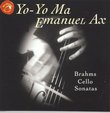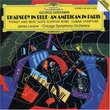| All Artists: Ludwig van Beethoven, Leonard Bernstein, Vienna Philharmonic Orchestra Title: Beethoven: Symphony No. 3, Overture To Fidelio / Bernstein, Vienna Philharmonic Orchestra Members Wishing: 0 Total Copies: 0 Label: Deutsche Grammophon Release Date: 7/24/1990 Genre: Classical Styles: Forms & Genres, Theatrical, Incidental & Program Music, Historical Periods, Classical (c.1770-1830), Symphonies Number of Discs: 1 SwapaCD Credits: 1 UPC: 028943102421 |
Search - Ludwig van Beethoven, Leonard Bernstein, Vienna Philharmonic Orchestra :: Beethoven: Symphony No. 3, Overture To Fidelio / Bernstein, Vienna Philharmonic Orchestra
 | Ludwig van Beethoven, Leonard Bernstein, Vienna Philharmonic Orchestra Beethoven: Symphony No. 3, Overture To Fidelio / Bernstein, Vienna Philharmonic Orchestra Genre: Classical
A year after this recording was made, the principal violist of the Vienna Philharmonic confided to a music critic that "When we play Beethoven with Bernstein we do it Bernstein's way, but when we play Beethoven with Bohm, ... more » |
Larger Image |
CD DetailsSynopsis
Amazon.com A year after this recording was made, the principal violist of the Vienna Philharmonic confided to a music critic that "When we play Beethoven with Bernstein we do it Bernstein's way, but when we play Beethoven with Bohm, we do it Beethoven's way." Perhaps, but then Viennese string players have been saying that about every conductor since Otto Nicolai. In any case, the VPO strings give their all in this performance; their playing, and that of their colleagues in the wind and brass, is pure guts and glory. Bernstein's affinity for the music is beyond challenge, and the vivid recording brings it all home. --Ted Libbey Similar CDsSimilarly Requested CDs
|
CD ReviewsBrilliant, moving and intense Benjamin Seldon | Sydney, NSW Australia | 12/24/2004 (5 out of 5 stars) "I have been forced to write this as a response to some of the unintuitive and gormless reviews written below. In a nutshell, Bernstein's 'Eroica' is a dramatic and brilliant reading of a dramatic and brilliantly intense symphony. Bernstein is less of a Classicist than he is a Humanist. Invariably, he searches for and draws out the human dialogue to found in classical music. His Mahler symphonies, for example, are brilliant and inspired narratives that translate sound into human drama. The same can be said of this recording. As one reviewer remarked , the Bernstein perfomrmance is "dynamic and marked by Bernsteinian rubato options that render this recording unforgettable." Rubato refers the expressive fluctuation of speed within a musical phrase. This is particularly notable in the second movement, the famous Funeral March. Bernstein clocks this movement in at 17'40", a full two minutes longer than Abbado's 3rd with the Wiener philharmoniker on DG. It is a wonderful two minutes. More classical interpretations of this movement seem comparatively unispired. Bernstein lays this movement out on the grandest possible scale. It is dark, dreadful and awe inspiring; the fugue, when it comes, is breathtakingly personal and powerfully intense. The dignity, tragedy and drama is riveting; the 5 chords which bring the fugal section to a close are harrowing, ripping from one's insides the remnants of what the fuge has left torn and shredded. The finale is equally pentrating and profound, very much the triumphant music and assertion of man that it was meant to be. One reviewer denigrated the music in this recording as 'mortal'. Of course it is, profoundly so. It relates to human beings and their destructive and beautiful mortal humanity - and that is exactly what makes this recording the same music that one critic at its electrifying and frightening debut in 1805 called 'daring, wild and... startling beautiful'. At its debut, members of the audience and notable critics lamented the new symphony's 'inordinate length' and 'lawlessness'. One can only assume that the ungracious wretches below who are critical of Bernstein's approach sprang, or crawled, from he same mould. We should not forget that prosterity has since identified these men as the docile pompous peasants they were. As for concerns about the cover...could we be any more superficial? This is perhaps the single most influential piece of music I have heard -not only because it the first piece of classical music I conciously remeber hearing- and this recording captures that intensity more strikingly than any of the other many recordings I have heard. There are many reasonable recordings of this symphony - each with something to offer someone. 1 star ratings are really just too emotive to be credible. The Szell / Cleveland is a really fine version of this symphony. It is the extra something, however, a deep intuition in this recording which makes this an outstanding choice." Excellent Beethoven / Bernstein Robert Macedo-Alves | Madeira, Portugal | 08/28/2000 (5 out of 5 stars) "As always, this Beethoven recording can easily be identified as a "Leonard Bernstein recording". His Beethoven interpretations are dynamic and marked by Bernsteinian rubato options that render this recording unforgettable. Really, really very good." Warm David Saemann | 11/13/2008 (5 out of 5 stars) "My first encounter with Bernstein in the Eroica was on his 1953 Brunswick recording with the N.Y. Stadium Symphony, basically members of the Philharmonic. That is a titanic recording, with rich string sound and high drama. This 1978 recording from Vienna is quite different. It takes place on a more humane, less dramatically elevated plane than the earlier version. The first movement is quite slow, almost conversational, without the whiplash chords so familiar from conductors like Solti and Toscanini. The Funeral March has real gravitas. Bernstein is not afraid to deviate from his main tempo to make an interpretive point, and one gets the feeling that this whole movement amounts to a commentary on death for Bernstein. The last two movements swing and sway delectably. On the whole, this is not an Eroica with thrills and spills, but instead is a highly personal self-revelation. I liked it very much. The Fidelio Overture goes rather slowly, but is enjoyable nonetheless. The sound engineering throughout is up close and well balanced, if without much resonance. In sum, this is a very unique and quite valid Beethoven experience."
|

 Track Listings (5) - Disc #1
Track Listings (5) - Disc #1









